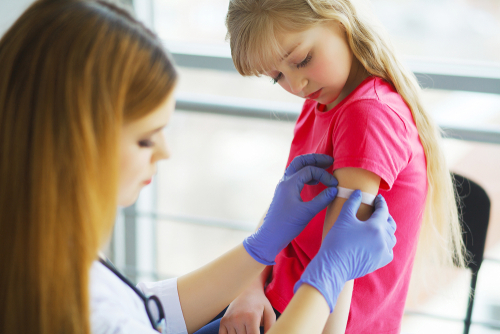
COVID-19 has disrupted many things, and after more than a year of adapting to pandemic life and juggling new routines, scheduling your children's annual immunization appointments might feel a bit overwhelming. Due to lockdowns, illness, or virtual schooling, you may have skipped your child’s appointments last year, but now is the time to get back on track and get your child caught up on well visits and recommended vaccinations.
What immunizations do kids need to attend school?
In order to enter school, your children require certain vaccinations. While these vary by state, Kathleen Carney, APN, a member of Summit Health’s internal medicine team, says that children should generally receive the following before entering kindergarten or first grade:
- A series of the diphtheria, tetanus, and pertussis vaccine
- A series of the polio vaccine
- A series of the hepatitis B vaccine
- One dose of varicella vaccine
- The second shot of the measles, mumps, rubella (MMR) vaccine
Then there are the recommended inoculations, such as the meningococcal vaccine and the flu shot. "All school-aged children are eligible for the influenza vaccination," says Daniel Hart, MD, an infectious disease specialist at Summit Health. "This will be especially important this year as COVID-19 will still be circulating, and some symptoms are similar."
COVID-19 Vaccination
As for the COVID-19 vaccine, he says, "The vaccines are currently approved for age 12 and above. Further studies are ongoing for younger school-aged children."
"Children can still be exposed to these infections from contact with children outside of school, or even with adults, so all eligible kids should receive the vaccine," Dr. Hart says.
Carney agrees. "Schools aren't the only place a child might come across a preventable disease," she says. "More than ever, our communities need to have high vaccination rates to protect against other outbreaks as we move forward to opening businesses and events to full capacity."
Because the pandemic has stretched health care resources, preventing infections is paramount—especially with influenza season approaching. "Vaccinations have been shown to protect against infection," says Dr. Hart. "It's important for children to be protected for their own health, and also to protect against spreading infection to other children and adults."
Skipped Immunizations
Some parents are reluctant to visit pediatricians because they don't want to admit they've missed immunizations. But Dr. Hart and Carney both say that you don't have to worry. Your children won't need to start a series over.
"Parents just need to schedule an appointment with their pediatrician and continue the series of vaccines that are incomplete," Carney says. Even with the HPV vaccine series, if you miss a dose, the pediatrician can decide when to administer the second or third one.
Special Needs
Children who have special needs or who have contracted COVID-19 can and should receive the required and recommended immunizations for their age groups. But they may want to schedule them differently or wait until any infections have passed. For parents of kids who have had long COVID or severe complications, Carney recommends that parents consult with their child’s physician.
Adult Vaccinations
Immunizations are not just for children. Based on age, travel, and health conditions, adults may be at risk for preventable diseases. Additionally, childhood vaccines can wear off over time, so it’s best to check with your provider to see what vaccines and/or boosters you may need to maintain optimal health. The flu vaccine is recommended every season for all ages 6 months and older, unless you have a life-threatening allergy to an ingredient in the vaccine.
Side Effects
"There can be side effects from vaccines, but when they occur, they are generally mild," Dr. Hart says. "When children get infected, their symptoms are typically much worse."
In general, he notes, the benefits of vaccination for any disease widely outweigh the risks. But like Carney, he encourages parents to speak about concerns with their pediatricians rather than rely on the internet. "There's a lot of misinformation about vaccinations," Dr. Hart says. "It's best to speak with a trusted source."
